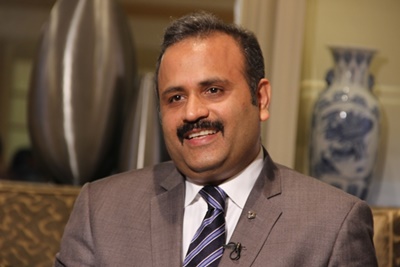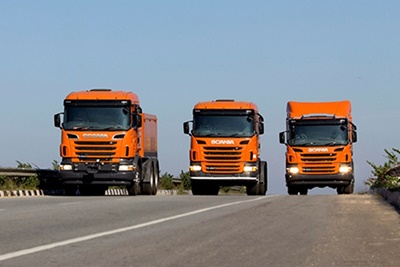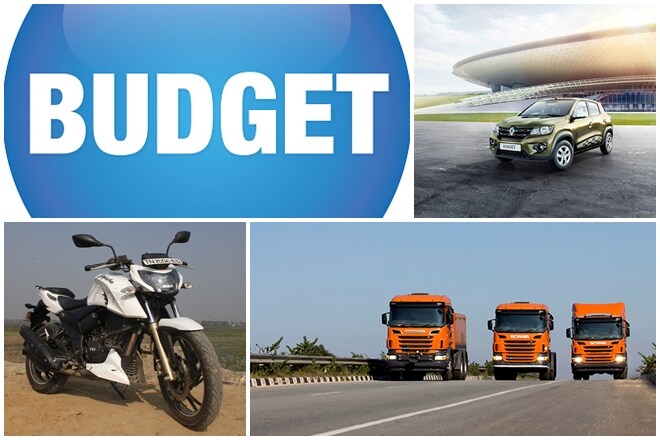After the announcements made by the present Finance Minister of India, Arun Jaitley about new implementations that would work in favour for most industries, all eyes are set on the upcoming Union Budget. The implementation of GST (Goods and Services Tax) alongside better initiatives if done right, would not only work in favour of the Indian Automotive sector but also increase job opportunities as well as hone the entrepreneurship abilities of an individual under the ‘Skill India’ programme. Here is what the industry is expecting from the upcoming Union Budget.
Passenger Vehicle Segment- Four Wheelers

According to Sumit Sawhney, Country CEO and MD, Renault India Operations, “The Indian automotive industry is instrumental in shaping the country’s economy and has been a major employment and GDP contributor due to which it is regarded as a ‘Sunrise sector’ under ‘Make in India’. Owing to multiple macro-economic factors, the industry has not achieved its growth potential during the last few years. Announcements during Union Budget 2017 thereby will be keenly observed by the automotive industry, which expects the government to introduce pro-business measures to boost the industry. In addition to the GST implementation, another area that would need to be focused on by the government is scrappage policy or ‘Voluntary Vehicle Fleet Modernisation Plan (V-VMP)’ in the interest of environment by keeping older cars off public roads.”
Other measures that are expected by the French carmaker include reduction in income and corporate tax, restoration of weighted reduction on R&D expenditure, increase in FTA (Free-Trade Agreement) and further investment in infrastructure on ports for a more productive export hub as well as reduction in utility costs. These implementations would attract more FDIs (Foreign Direct Investors) to invest in the country thereby improving the overall economy. Sawhney also added, “Union Budget 2017 is going to be introduced at a time when key macro-economic factors, such as, inflation, fiscal deficit and current account deficit are within manageable range. What’s more? The stage seems to be set for a stable interest rate regime. The time therefore is opportune for the government to introduce a revolutionary budget that can uplift consumer sentiment and put the industry in a higher growth trajectory.”
Passenger Vehicle Segment – Two Wheelers

The two-wheeler industry is also looking forward to the Union Budget 2017 as it may work in favour of the industry and allow better progress. According to KN Radhakrishan, President and CEO, TVS Motor Company, “The Government should introduce balanced economic measures which enhance ease of doing business within the country, boost consumer demand and catalyse economic growth. The Indian auto industry observed a strong rate of growth throughout 2016, largely driven by positive policy measures, healthy economic environment leading to robust demand across consumer pockets. It is furthermore crucial for sectors like automobile as it affects the larger operating ecosystem of the sector, which is linked with infrastructural developments, manufacturing policies and frameworks, tax regime etc. Therefore, in our view the finance ministry must minutely evaluate these crucial economic contributors and lay necessary thrust on each one of them, so as to give further impetus to growth and enhance disposable incomes and boost spending.”
Also Read: TVS Apache RTR 200 4V Review: Streetfighter in a Tuxedo!
Commercial Vehicle Segment

Stefan Palskog, President and Mikael Benje, Managing Director, Scania India stated:
We look forward to the budget for 2017-2018 and hope the government will continue its drive towards “Make in India”, “Smart cities” and “Swachh Bharat” and the budget will highlight policy action to encourage every shift in the market towards a clean green low carbon choice. We hope that in this budget the government will give impetus to manufacturers that develop and deliver innovative sustainable solutions. The shift from private transport to public transport is essential to address the environmental impact from carbon emissions, we hope the government will address the issue and encourage public transport and suggest in the budget financial implications on carbon footprints.
In line with the ‘Make in India’ initiative we are looking forward to financial allocations and tax benefits to encourage manufacturing and use of sustainable transport solutions that are safer, greener and more fuel-efficient and drive on locally produced Biofuels. We hope that there will be funding for an industry development of ‘waste to fuel’ to address multiple issues like waste management, enabling cleaner air, and reduced dependency on fossil fuels in line with the ‘Swachh Bharat’ initiative for economic, social and environmental sustainability. Sustainable urban mobility is the need of the hour and we look forward to growth-oriented policies to accelerate the growth and development of sustainable urban transport for “Smart cities”. We hope that the government will continue to allocate funds towards initiatives that focus on building low carbon/carbon neutral infrastructure and public transport systems in keeping with its commitment to addressing climate change and environmental degradation. We believe that the much awaited GST will be executed at the earliest as it will reduce costs and waste across supply and value chains.
Component Manufacturing Industry
ACMA expects Union Budget to uplift market sentiments and Rattan Kapur, President, ACMA (Automotive Component Manufacturers Association of India) said “We anticipate the forthcoming Union budget to uplift the market sentiments which will allow for growth and development of the domestic auto components sector. Achieving world-class quality and new product development will only be possible in the auto component industry by enhancing spend on R&D and creating relevant infrastructure for innovation. With significant changes in emission and safety regulations, it is imperative for the component industry to enhance their R&D expenditure. It is therefore critical that earlier weighted deduction of 200 percent on R&D expenditure be immediately restored. That apart, while we are eagerly awaiting the announcement of GST implementation, it critical that the GST rate on auto components is low and a reasonable transition period is extended to the industry to effectively adapt to the changes in the taxation environment”
Other suggestions by ACMA also included a lower GST rate as a higher rate would adversely impact the auto component industry especially the aftermarket that continues to suffer due to issues of counterfeiting/non-genuine/substandard/imported parts. The auto components should therefore should be kept at the lower rate of 18 percent rather than the 28 percent higher rate in addition to Adequate transition time for MSMEs (Ministry of Micro Small and Medium Enterprises) to adopt GST as they may find immediate implementation and necessary compliance to GST an impediment. Thus, a transition period of one to two years be given to the MSME sector to understand the provisions of the law and meet necessary compliance norms. Creating a single window GSTN help desk for MSMEs would be beneficial.
Another recommendation by ACMA also suggested elimination/reduction of Customs Duty on alloy steel, mild steel, aluminium alloy, secondary aluminium alloy and copper wire. Customs Duty on these raw materials is higher than that on finished auto components due to Trade Agreements and Antidumping/Safeguard duty and there is an urgent need to address this anomaly. The current depreciation rate of 15 percent also does not assist auto companies in meeting the objective of timely accumulation of funds for replacement of assets. The rate should be increased to at least 25 percent, and to 40 percent for domestically manufactured capital goods to encourage local manufacturing, as per ACMA.
The recent regulatory changes in emissions and safety norms call for enhanced spend on R&D by the auto component industry. ACMA has recommended that rate of weighted deduction be restored to the enhanced rate of 200 percent. Weighted Deduction should also be extended to R&D outsourced to Third-Party Service Providers/Other Institutions. Spend on roads constructed for test tracks and prototype development should also qualify for such R&D benefits.
[jwplayer 3H4WO4sD]
Electric Vehicle Industry
Ayush Lohia, CEO, Lohia Auto Industries said:
At present, demonetisation has created an unfavourable environment for the auto industry on the whole. The auto industry is pinning hope on the Union Budget 2017 as it will uplift consumer sentiment and infuse positive environment for auto industry including electric vehicles. Automobile industry players are working toward extension of the incentive scheme for electric mobility under the FAME scheme and hoping for a positive response from the upcoming union budget with a long-term plan for at least next five years. This extension will lead to achieving India’s electric vehicle target which in turn will undoubtedly help in reviving of the industry.
The industry is also expecting that GST will come in effect from April 1, 2017 as far as the taxation side is concerned. GST, as we all are aware will bring good news for all the companies in the manufacturing sector owing to the expected benefit. Those companies who are locally manufacturing vehicles can expect benefit because of cost advantage due to lower taxation. GST will uplift the electric vehicle industry on the taxation front as it will absorb many of the currently levied state, central government and local body taxes. As far as the electric vehicle industry is concerned the suppliers, manufacturers, dealers and particularly the customers should benefit from the Union Budget 2017. Furthermore, GST will transform India into ‘one market’. Government will infuse a positive spirit in the economy and bring in a lot more efficiency in operations as the compliance burden, on the whole, will reduce. From the perspective of Indirect tax, the entire country will be perceived as ‘One Market’ which will lubricate operational competence.
In the current scenario, some states are still charging heavy taxes on electrical vehicles whereas some states are charging around five percent. Considering all goes well, it is expected that GST rate should reduce the total tax burden on electric Vehicles. Under this favourable climate, the GST rate is expected to be in the lowest possible slab. Additionally, focus on infrastructure development and government initiatives for development and promoting of electric vehicle will also create a promising environment for this industry.

Kapil Shelke, Founder & Director, Tork Motors Pvt Ltd added
While there has been a concerted effort by the government in endorsing hybrid and electric vehicles, the EV players are pinning huge hopes on the upcoming Union Budget to foster further growth for the segment. To begin with, we expect the government to continue and extend the duration of the already existing incentive under their FAME scheme launched in 2015, offering subsidies on electric and hybrid vehicles of up to Rs 29,000 for electric two-wheelers and Rs 1.38 lakh for electric cars.
Another critical aspect that needs attention is the high import duties on lithium ion batteries and other parts apart from other forms of taxes which contribute nearly 20 percent to 70 percent of the overall cost of a product. Considerable reduction in import duty can enable EV players to offer products at a competitive price point to the consumer. Also, rather than having tax structure in place which is offset by a subsidy on purchase of EVs, reducing taxes or offering tax concession would help faster adoption and achieve the ambitious target of six million electric vehicles on road by 2020-21. In addition, waive off on income tax on a company for the first three years of business can go a long way in fostering growth and encouraging other players to join the bandwagon.
Overall, we seek support and concrete incentives from the Government in promoting hybrid and electric vehicles with specific budget allocation for the EV segment and at the same time boost overall consumer sentiment.
As the Union Budget 2017 will be announced on 1st February, 2017, the Indian Automotive Industry is eagerly waiting for what would work in favour wherein the Government should also consider the opinions given by various industry verticals and experts on how to encourage diverse and new mobility solutions alongside existing modes of transport.


